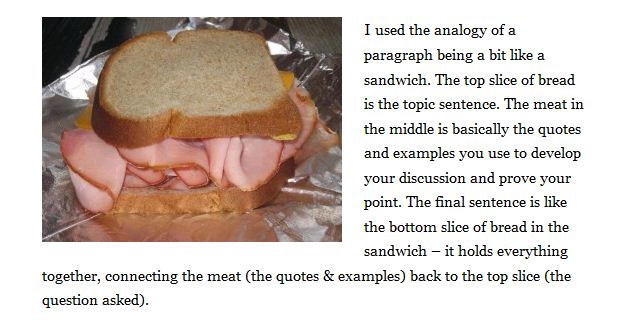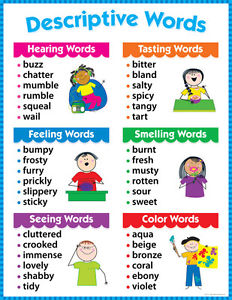Use adjectives.
The reader needs details so that they can picture the number/quantity, size, shape, weight, colour, brightness, texture, condition, sound, smell, taste, speed, temperature, age, distance, time, origin, location, emotion towards or opinion of the thing being described.
Take this sentence: “The car raced through the town”
I’ve got a good verb – “raced” but otherwise I know very little about either of the things being described – the car or the town. If I add a few adjectives, suddenly these nouns come to life!
“The tiny battered Mini raced through the sleepy seaside town”
You’ll notice I changed “car” to “Mini” so you could picture an actual make and model – “car” is a pretty crap noun because it’s a common noun but other than ‘engine, four wheels’, it doesn’t give you a specific picture in your mind.
For a vast list of adjectives, click on this link.
WARNING: Too many adjectives can make your writing worse, particularly when you select over-used adjectives such as big/small, happy/sad, good/bad, fast/slow. Writing which draws attention to itself – or rather which draws loads of attention to itself by being overly flowery – is known as purple prose.
THIS IS NOT A COMPLIMENT.
PURPLE PROSE IS BAD!
You’ll annoy the reader because they’ll feel like you’re showing off and you’ll probably slow the pace of your sentences to a crawl as well.
Here is an example of just enough adjectives to keep the flow of the writing and at the same time offer us a clear picture:
“I could see a blue light flashing in the distance. My head was throbbing and when I lifted my swollen hand to my temple, sticky, wet blood smeared my fingertips. A low moan of pain was just barely audible amid the screaming sirens and the screeching whirr of the chainsaw that was going to cut me out of the train wreckage. It was only later I realised that I was the one moaning. Everyone else was dead”
Here’s an example of purple prose – add in 11 more adjectives (the ones I’ve underlined) and suddenly it goes from descriptive & well-paced to incredibly dragged out and intensely irritating!
“I could see a vivid blue light flashing in the far-off distance. My heavy headachy head was throbbing and when I lifted my swollen sore hand to my aching temple, sticky, wet blood smeared my shaking fingertips. A low moan of intense pain was just barely audible amid the screaming sirens and the screeching whirr of the vicious chainsaw that was going to soon cut me out of the twisted train wreckage. It was only later I realised that I was the one moaning. Everyone else was dead”
Some writers prefer a very minimalist style to keep a fast pace in their writing – something like this:
“I could see a blue light flashing. My head was throbbing. I lifted my swollen hand to my temple and blood smeared my fingertips. A moan of pain was just barely audible amid the sirens and the whirr of the chainsaw that was cutting me out of the train wreckage. It was only later I realised I was the one moaning. Everyone else was dead”
So, you don’t HAVE to include loads of adjectives to write descriptively…








